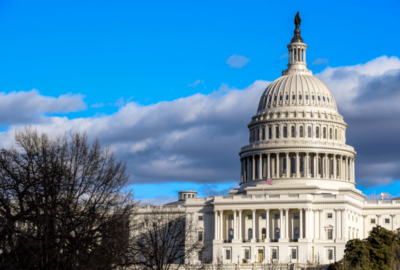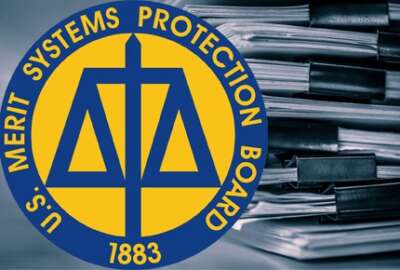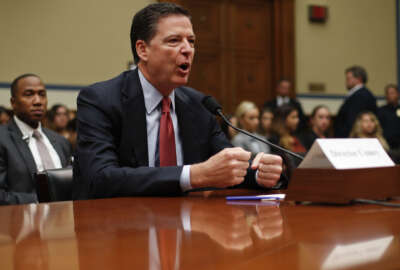Federal employees have some of the worst whistleblower protections in the country, advocates say
Whistleblower protections for federal employees are some of the worst in the U.S. labor market, advocates say, and they see recent bipartisan legislation as "the...
Whistleblower advocates are hopeful 2021 is the year they can make stronger protections for federal employees a reality.
And they believe it’s imperative this year, especially as federal employees are managing trillions of dollars in new government spending on COVID-19 relief and potentially infrastructure.
“While the United States was the pioneer of whistleblower rights, in some ways our rights are the dinosaur rights now,” Tom Devine, legal director for the Government Accountability Project, said last week at the National Whistleblower Center’s annual celebration of those who disclose waste, fraud and abuse. “We haven’t kept pace with the global best practice standards in the rest of the world.”
It hasn’t been for lack of trying.
“There have been numerous attempts at reform, time and time again,” said Stephen Kohn, a whistleblower attorney and founder of the National Whistleblower Center,” who called the procedures for federal employees “some of the absolute worst protections anywhere.”
“Every time we pass a new reform bill we say, ‘Oh, it’s going to get fixed!’ And it didn’t get fixed. The only fix in our view is to get jury trials and get court access for federal employees,” he added.
Advocates see promise in the Whistleblower Protection Improvement Act, which House Oversight and Reform Committee Chairman Carolyn Maloney (D-N.Y.) and Rep. Nancy Mace (R-S.C.) introduced earlier this year. The bill already cleared the oversight committee and now awaits a full vote in the House.
Devine likened the bill to “the promised land” for federal employees.
“The federal workers who have the highest-stake disclosures, to contribute the most to the country, have the weakest rights of almost any group in the U.S. labor force,” he said. “This is an important opportunity for us. Everybody who’s involved in this movement needs to get on the horn to their congressmen and senators and tell them to make this a priority. If they’re worried about trillions of dollars of new government spending, then how about protecting the people who can expose the fraud, waste and abuse?”
The WPIA prohibits agencies from launching retaliatory investigations against whistleblowers and bars them from retaliating against federal employees who share information with Congress.
“These protections are absolutely overdue,” Melissa Wasser, policy counsel for the Project on Government Oversight, said of the bill.
Perhaps most notably, the bill would give federal employee whistleblowers access to a jury trial, which has long been a priority for members of Congress and whistleblower advocates. Specifically, it allows whistleblowers to appeal their cases in federal district court if the Merit Systems Protection Board doesn’t issue a decision within six months, or eight months for more complex cases.
“This would help whistleblowers get their cases heard, especially since the only administrative remedy they have right now is going through the Merit Systems Protection Board, which has been absolutely paralyzed since January 2017,” Wasser added.
The MSPB has been without a quorum for more than four years, and it hasn’t had any board members at all since 2019. There were 3,325 pending petitions for review at the board as of the end of June, according to the agency’s data.
President Joe Biden has announced Cathy Harris and Raymond Limon as his nominees to be MSPB chairman and vice chairman, respectively. But the nominees must clear the Senate confirmation process, and it’s unclear whether they’ll make headway before the upcoming August recess.
The Senior Executives Association and Professional Managers Association have both written to leadership on the Senate Homeland Security and Governmental Affairs Committee, urging them to consider Biden’s appointees as soon as possible.
“The negative impacts of these vacancies are far reaching for federal employees, agencies and taxpayers alike,” SEA President Bob Corsi wrote in a July 16 letter. “We urge the committee to bring these nominees forward as soon as possible. It is past time for the Senate to act and restore a quorum to the board. Each day the board remains member-less, the backlog of cases grows.”
It’s for these reasons that whistleblower advocates are especially eager to give federal whistleblowers another remedy to have their cases heard.
While House action on the WPIA is perhaps more likely this year, the National Taxpayers Union is focused on the best path for the legislation in the Senate.
“A lot of the work we’re doing right now is talking with our friends in the Senate, both on the Republican and the Democratic side, to figure out how best we can get the package of reforms in WPIA passed into law,” said Andrew Lautz, NTU’s director of federal policy. “That might not be in an exact bill that is exactly titled the Whistleblower Protection Improvement Act. It may come, as many legislative initiatives do, in some larger legislative package that gets considered by Congress later this year. But what we’re doing is talking with whistleblower champions in the Senate who really cross the ideological spectrum.”
Whistleblower advocates also see the FBI as ripe for change. The Civil Service Reform Act allowed the FBI to establish its own whistleblowing system, which advocates at the Government Accountability Project called one of the least effective.
“The system of rights to protect FBI whistleblowers for all practical purposes is the FBI’s internal management issuing unpublished decisions that routinely rubberstamp whatever retaliation is challenged,” said Irvin McCullough, deputy director for legislation at the Government Accountability Project. “There have been recent attempts at reform through the FBI Whistleblower Protection Enhancement Act. We’re very eager to revive these attempts.”
Current law places limits on who FBI employees can disclose instances of waste, fraud and abuse to, though Congress in 2016 attempted to fix that arrangement.
The FBI Whistleblower Protection Enhancement Act (FBI WPEA), however, didn’t make those fixes retroactive, meaning many longtime whistleblowers at the agency are still waiting for their day in court.
In a National Whistleblower Day speech, Chuck Grassley (R-Iowa), chairman of the Senate Whistleblower Protection Caucus, said he’s working on legislation to strengthen protections for FBI employees.
Copyright © 2025 Federal News Network. All rights reserved. This website is not intended for users located within the European Economic Area.
Nicole Ogrysko is a reporter for Federal News Network focusing on the federal workforce and federal pay and benefits.
Follow @nogryskoWFED







